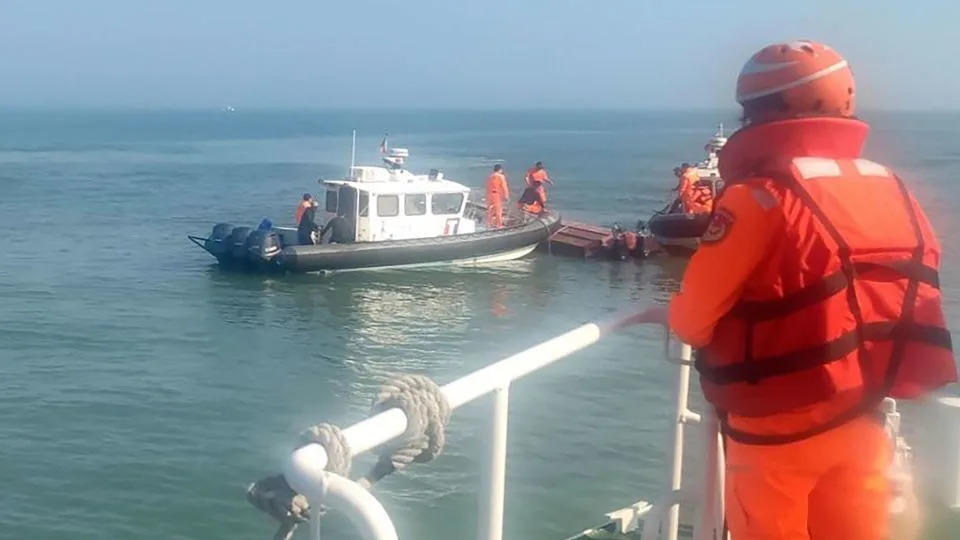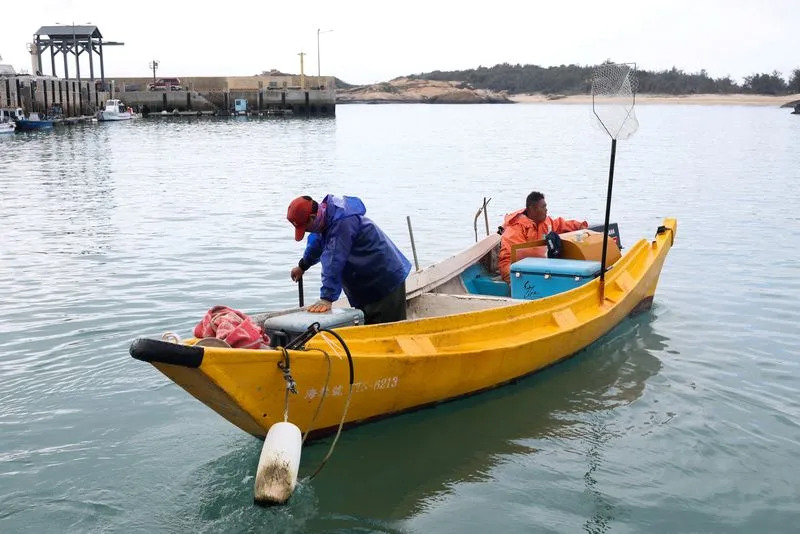King Xia, a Taiwanese tourist boat, was taking 23 passengers on a journey around Taiwan’s outlying Kinmen Islands just miles from China’s southeastern coast when it was intercepted by two Chinese coast guard vessels.
Six Chinese officers swooped onboard, checking the vessel’s route plan, certificate and the licenses of its 11 crew members in a “forced” inspection that lasted about half an hour, according to Taiwan’s coast guard, which said King Xia had “veered toward” the Chinese side of the water to avoid shoals.
The unprecedented encounter with Chinese law enforcement at a time of heightened tension between Beijing and Taipei startled Taiwanese passengers onboard.
“It’s super scary,” a passenger told Taiwan’s United Daily News in a video upon returning to shore under the escort of a Taiwanese coast guard ship on Monday. “(I was) so afraid that I wouldn’t be able to come back to Taiwan.”
Kuan Bi-ling, head of Taiwan’s Ocean Affairs Council, said Tuesday the incident triggered “panic” among the Taiwanese public.
For years, sightseeing boat tours between Kinmen and Xiamen, the closest city on the Chinese mainland, have offered Taiwanese tourists a chance to gaze at China’s dazzling skyline without the hassle of border checks, with China operating similar tour boats for its citizens too.
But now, the popular route has been caught up in rising tensions as China’s coast guard ramps up patrols in the area – in what analysts say is Beijing’s latest effort to tilt the status quo in its favor by undermining Taiwan’s control of the waters.
The escalation came after two Chinese fishermen drowned last week when their speedboat capsized during a pursuit by Taiwan’s coast guard, who accused them of trespassing into prohibited waters around Kinmen.
Beijing has blamed Taiwan’s ruling Democratic Progressive Party (DPP) for the deaths and seized on the opportunity to expand its presence in the waters.
Since the weekend, Beijing has denied Taiwan’s designation of “prohibited or restricted waters” near Kinmen, while its coast guard has launched “regular patrols” in waters around the islands to step up law enforcement.
On Tuesday morning, a Chinese coast guard vessel intruded into Taiwan-controlled waters near Kinmen for an hour, according to Taiwan’s coast guard, which said it dispatched a ship of its own to sail alongside the Chinese vessel and used radio and loudspeakers to drive it away.
Ian Chong, a political scientist at the National University of Singapore, said the latest measures are part of China’s “gray zone” tactics, referring to coercive or aggressive state actions that stop short of open warfare – something Beijing has used increasingly in recent years in the East and South China Seas, as well as toward Taiwan.
The inspection of a Taiwanese tour boat by China’s coast guard, which Chong said had not happened before, was meant to provoke Taiwan and see if it would either escalate or accept this sort of behavior as given.
“(The Chinese coast guard) chose a tourist vessel because it’s high profile – you would expect lots of people on the boat with cameras and phones,” he said.
“They’re trying to erode and contest Taiwan’s ability to administer those waters.”
Taiwan’s coast guard has said it would continue to enforce the law in waters it controls and “flexibly adjust its operations to ensure the peace and security.”
Kuan, head of Taiwan’s Ocean Affairs Council, said Taiwan authorities would “educate” Taiwanese boat captains that they don’t need to stop for Chinese coast guard inspections. In such instances, they should immediately notify the council for assistance, she said.
The stakes are high, as the increased presence and closer proximity of Chinese and Taiwanese coast guard vessels raise the specter of miscalculations that could potentially spiral into open conflict.
Speaking to reporters about the inspection by the Chinese coast guard, Taiwan’s Defense Minister Chiu Kuo-kcheng highlighted such risks, saying the defense ministry is “very concerned” about potential miscalculations.
To avoid further escalating tensions, Taiwan’s military will not “proactively intervene” in the incident, he said.

Early test for new president
China has already increased pressure on Taiwan after Vice President Lai Ching-te, a staunch defender of Taiwanese identity and sovereignty, won the presidential election in January, handing the DPP a historic third consecutive term.
Days after the election, Beijing poached one of Taipei’s few remaining diplomatic allies, the Pacific Island nation of Nauru.
Last month, Taiwan protested China’s “unilateral” adjustment of a flight path that could result in civilian aircraft flying closer to the sensitive Taiwan Strait median line, adding pressure on Taipei in its aviation safety and aerial defense.
The median line has long served as an informal demarcation between China and Taiwan, which Beijing claims as its own territory. China does not formally recognize the existence of such a line but had largely respected it until recent years.
Since then-US House-speaker Nancy Pelosi’s visit to Taipei in 2022, Chinese military jets have regularly flown over the median line as Beijing ramps up military pressure on the self-ruled democracy.
Tian Feilong, a hardline legal scholar in Beijing, likened the increased patrol by the Chinese coast guard in waters around Kinmen to China’s “breakthrough” of the median line following Pelosi’s visit.
It’s not only “a declaration of sovereignty” by Beijing, but also “a gradual demonstration and establishment of a new normal” in China’s governance and law enforcement in the Taiwan Strait, Tian wrote in a commentary on guancha.cn, a nationalist Chinese news site.
Chong, at the National University of Singapore, expects an increase in Beijing’s “gray zone” measures in the coming months, in the lead-up to Lai’s inauguration as Taiwan’s next president in May.
“(It’s) an effort to test the incoming Lai administration to see if they will give any concessions – or whether they’ll make any mistakes that Beijing can capitalize on,” he said.
“Such slow, incremental behavior makes it difficult to respond strongly to, but also, giving in would be in a way ceding ground to Beijing.”
On frontline Taiwan islands, fishermen wary of China tensions
A fishing boat arrives at a port in Kinmen.
Taiwanese fishermen in sensitive waters around frontline islands near the Chinese coast say they are worried about rising tensions, after two Chinese nationals died during a chase with Taiwan's coast guard.
The two died when Taiwan's coast guard tried to expel their boat, which then overturned, after it had gotten too close to an islet that is part of the Kinmen islands, governed from Taipei since the end of the Chinese civil war in 1949.
A furious China, which claims Taiwan as its own territory, responded by launching its own coast guard patrols, and on Monday boarded a Taiwanese tourist boat operating off Kinmen.
"After this incident, fishermen will still be psychologically affected to an extent when they go to sea," said Huang Tsung-feng, secretary of the Kinmen Fishermen's Association, although he said the number of boats heading to sea in the past few days was still normal.
"If the fishery administration fleet on the mainland comes out, this behaviour will cause some pressure on our fishermen while working at sea. They will be afraid because of this."
Kinmen, home to around 100,000 people, hosts a large Taiwanese military garrison, just a short boat ride from the Chinese cities of Xiamen and Quanzhou.
Taiwan's coast guard patrols its waters, and several of Kinmen's surrounding islets are heavily fortified and mostly off-limits to civilians, including Beiding, the islet near where the Chinese boat overturned.
China said last week it recognises no banned or restricted waters for fishermen around Kinmen.
One Kinmen fisherman, who asked to be identified by his family name Chen, said Chinese vessels often crossed into Taiwan waters.
"In fact, the most serious problem on our side is the fishermen from the mainland, who come over to our coastal areas to release their nets, sometimes 50 or 60 at a time," he said.
"When the coast guard comes, they run away; when the coast guard doesn't come, they just fish over here."
Kinmen was the scene of sometimes intense fighting between Taiwanese and Chinese forces during the height of the Cold War but is today a popular holiday destination, with many tourists drawn to its old bunkers and bullet-pocked wartime sites.



